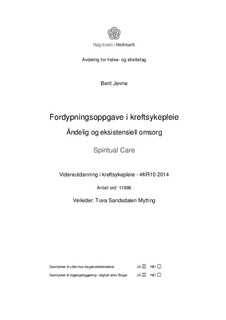| dc.contributor.author | Jevne, Berit | |
| dc.date.accessioned | 2015-12-21T12:15:15Z | |
| dc.date.available | 2015-12-21T12:15:15Z | |
| dc.date.issued | 2014 | |
| dc.identifier.uri | http://hdl.handle.net/11250/2368699 | |
| dc.description.abstract | Norsk sammendrag: Hos kreftpasienter i palliativ fase dukker det gjerne opp åndelige og eksistensielle spørsmål. I denne oppgaven har jeg valgt å fokusere på hvordan kreftsykepleier gjennom kommunikasjon kan bidra slik at pasienter i palliativ fase får dekket sine åndelige og eksistensielle behov. Kommunikasjon er et viktig virkemiddel i å bli kjent med pasientene, og gjennom kommunikasjon kan kreftsykepleier får en forståelse for hvilke åndelige og eksistensielle utfordringer pasientene har.
Når vi rammes av alvorlig sykdom, og livet står på spill, blir de åndelige og eksistensielle spørsmålene fremtredende hos mange. Spørsmål som dukker opp er gjerne: Hva er meningen med dette? Hvorfor skjer dette meg? Finnes det en Gud? Forskning viser at det er sannsynlig at å få dekket sine åndelige og eksistensielle behov hjelper alvorlig syke og døende pasienter til å gi dem styrke, støtte og ferdigheter til å mestre belastningene de får i livets sluttfase.
WHO har utarbeidet noen prinsipper som sier noe om hva god palliativ pleie innebærer, hvor det blant annet påpekes at helsepersonell må ha helhetlig tilnærming og ha fokus på kommunikasjon til den alvorlig syke og døende pasienten. Forskning viser at det blant helsepersonell er mye usikkerhet om hva åndelige og eksistensiell omsorg er, og hva slik omsorg skal inneholde. For å imøtekomme palliative pasienters åndelige og eksistensielle behov, må kreftsykepleier ha den kompetanse som kreves. «Nasjonalt handlingsprogram for
palliasjon i kreftomsorgen» skriver om hvilke egenskaper og kvalifikasjoner personalet bør ha som skal utøve åndelig omsorg. Her i denne oppgaven har jeg trukket frem kreftsykepleiers kompetanse i kommunikasjon, da dette er viktig virkemiddel i å skape en relasjon til pasientene.
For å kunne ivareta åndelige og eksistensielle behov hos kreftpasienter, er det viktig at det blir større oppmerksomhet rundt temaet, og at det trengs mer kompetanse blant helsepersonell å vite hva åndelige og eksistensiell omsorg er, og hva denne omsorgen skal inneholde. | nb_NO |
| dc.description.abstract | English abstract: Cancer patients in a palliative phase often experience spiritual and existential questions. In the present thesis, I have chosen to focus on how cancer nurses can use communication in order to help patients in a palliative phase fulfil their spiritual and existential needs. Communication is an important means in getting to know the patients, and through communication, a cancer nurse can gain an understanding of which spiritual and existential needs the patiens have.
When we are struck by a serious disease and our lives are at stake, spiritual and existential questions often present themselves. Typical questions are: What is the meaning of this? Why is this happening to me? Is there a God? Research shows that having one's spiritual and existential needs met is likely to help seriously ill and terminal patients gain strength, support and skills to master the strain and stress they experience in the final phase of life.
WHO has developed a set of principles that describe what good palliative care entails. In these guidelines it is pointed out that health personnel must, among other things, strive for a comprehensive approach and focus on communication towards seriously ill and terminal patients. Research shows that there is a lot of uncertainty among health personnel as to what spiritual and existential care actually entails and what such care should include. To meet palliative patients' spiritual and existential needs, a cancer nurse must possess the necessary competence. "The National Action Programme for Palliation in Cancer Care" contains
guidelines regarding which qualities and skills personnel charged with spiritual care should possess. In this thesis, I have focused on cancer nurses' communication skills as an important means in establishing a relation with the patients.
In order to meet patients' spiritual and existential needs it is important to increase awareness of the subject, and among health care workers there is need for increased knowledge of what spiritual and existential care is and what it should include. | |
| dc.language.iso | nob | nb_NO |
| dc.subject | kreftsykepleie | nb_NO |
| dc.subject | åndelig omsorg | nb_NO |
| dc.subject | eksistensiell omsorg | nb_NO |
| dc.subject | palliativ fase | nb_NO |
| dc.subject | palliasjon | nb_NO |
| dc.title | Åndelig og eksistensiell omsorg | nb_NO |
| dc.title.alternative | Spiritual Care | nb_NO |
| dc.type | Student paper, others | nb_NO |
| dc.subject.nsi | VDP::Medical disciplines: 700::Health sciences: 800::Nursing science: 808 | nb_NO |
| dc.source.pagenumber | 52 | nb_NO |
